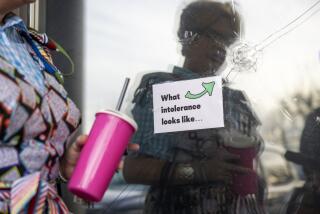Iraqis Defend Media Ban, Allege Incitement
As their colleague Aqila Hashimi lay near death, the victim of gunmen intent on assassination, members of the Iraqi Governing Council on Wednesday defended their controversial decision to rein in the media, charging that some outlets are inciting violence against the U.S.-backed governing body.
Hashimi, one of three women on the Governing Council, was ambushed Saturday by armed men who were hiding in a pickup truck. She was shot at least once in the abdomen and was being treated in a U.S.-run hospital on the grounds of the Republican Palace here.
“One of our colleagues is lying in the hospital. She is dying now -- she may die any second, any minute,” Iyad Allawi, a member of the Governing Council, said in a tone of uncharacteristic passion as he refused to back down from the panel’s decision to use its press law to ban two Arab satellite channels from reporting on the council and Iraqi ministries for two weeks.
Allawi accused Al Jazeera and Al Arabiya, two of the most popular Arab networks, of inciting violence against members of the Governing Council and fanning animosities between Shiite and Sunni Muslims, the two main sects in Iraq.
The ban set off controversy among the media in Baghdad and internationally, raising fears of a return to the censorship that stifled news coverage under ousted President Saddam Hussein.
“This is without any doubt a blow to press freedom,” said Robert Menard, secretary-general of the Paris-based organization Journalists Without Borders. “When organizations such as Al Jazeera and Al Arabiya give a voice to extremist political parties calling for violent and armed attacks, they are not themselves inciting violence. Such measures augur ill ... for the rapid transition to democracy in Iraq.”
Interestingly, the censors who once were responsible for limiting media freedoms under Hussein were split on whether the ban is a good idea. Some considered it a threatening sign that could lead to broader repression, but others saw it as a completely reasonable -- and familiar -- response. “The decision to ban Al Jazeera and Al Arabiya is a great one,” said Kawthar Tawfik Juboori, who worked as a censor for 30 years in the Information Ministry. “They used to be financed by Saddam. Now they show films of veiled men who terrorize people ... and destabilize security.”
It appeared, however, that the Governing Council was trying to distinguish between hate speech and censorship of information and intended to aim the ban at the former. But at a confusing news conference, Allawi, who is slated to assume the rotating council presidency Wednesday, demonstrated the thin line between the two.
Allawi blasted media organizations for using the term “Sunni Triangle,” a shorthand phrase employed by most journalists covering Iraq, to describe the area north and west of Baghdad where the preponderance of attacks on U.S. troops have taken place. “Some of these channels go on talking about the Sunni Triangle in Iraq, which doesn’t exist,” Allawi said. “We have only one unified Iraq.... We ask you to rectify this mistake.”
When pressed by reporters, Allawi said that the term was prohibited only when used in combination with programming that appeared calculated to foment violence.
“We are not going to allow [media] offices in Baghdad to operate by inciting racial and religious hatred,” he said. “They’ve shown hooded men demanding that members of the council be killed.”
He added that Al Jazeera’s cameramen were often present at the site of attacks aimed at coalition troops. “Once or twice could be coincidence, but Al Jazeera is always present,” he said. “It’s collusion.”
An official with the U.S.-led Coalition Provisional Authority said it does not believe that Al Jazeera has prior knowledge of attacks but said that the network’s reporters frequently arrive at the scene extraordinarily quickly, raising questions about whether they were tipped off quickly on the locations.
After an attack on Iraqi police recruits in Ramadi this summer, a Times reporter observed an Al Jazeera reporter who was filming the incident encouraging the crowd to chant anti-American slogans.
Al Arabiya released a long statement protesting the ban, saying its producers had tried to cover the Governing Council’s official sessions and other activities but that the network felt duty-bound to also show tapes and photographs produced by people of differing views, as long as they were accurate.
“This decision comes at a time when Al Arabiya was doing its best to follow all the orders issued by the GC.”
Several Western officials noted that Al Arabiya’s coverage has seemed more objective than Al Jazeera’s.
Hashimi’s deteriorating condition as well as continuing attacks appeared to precipitate the punitive measures, which had been under consideration for weeks, according to Western officials in Baghdad.
In an attack in Baghdad on Wednesday, a remotely detonated bomb aimed at a passing U.S. military convoy went off belatedly, hitting two minibuses filled with Iraqi civilians. One person was killed and 23 were wounded, five of them critically, according to police at the scene.
Also, Associated Press reported a bombing in a movie theater in the northern city of Mosul that showed sex films. Two people were killed and seven were injured.
At the scene of the Baghdad bombing, views on the news coverage of such situations as well as perceptions of the behavior of U.S. forces varied widely, with many people complaining about the lack of security but others expressing suspicions that the Arab television networks are working with Al Qaeda.
Ameer Hasan Taiey, an out-of-work civilian pilot for Iraqi Airlines, said: “Al Jazeera and Al Arabiya are cooperating with the terrorists, because they are reflecting their ideas. They were provoking hostile attitudes.”
*
Times staff writer David Holley contributed to this report.
More to Read
Start your day right
Sign up for Essential California for news, features and recommendations from the L.A. Times and beyond in your inbox six days a week.
You may occasionally receive promotional content from the Los Angeles Times.






